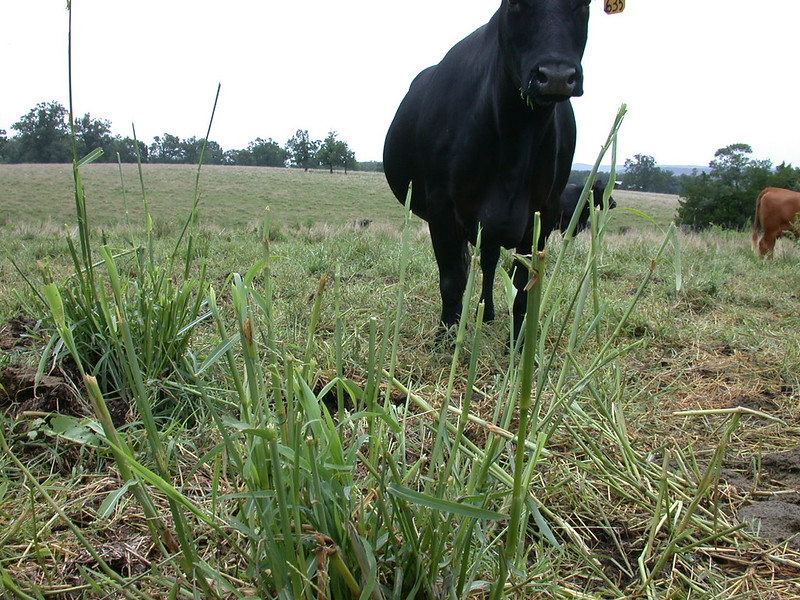Nov. 5, 2021
As winter frosts arrive, pasture managers should monitor for toxicity
By Ryan McGeeney
U of A System Division of Agriculture
Fast Facts:
- Several forages throughout Arkansas prone to developing prussic acid
- Given the chance, the acid will “off-gas,” rendering it safe for livestock to eat
- Avoid grazing at night, or turning hungry livestock out to graze johnsongrass
(302 words)
LITTLE ROCK — As the days grow shorter and overnight low temperatures begin dwelling beneath the freezing point, frost across the state is becoming a reality for Arkansas residents.
WINTERTIME CAUTION — Johnsongrass, sorghum (also known as sudangrass), greengraze, grain sorghum and forage sorghum are all forages prone to developing prussic acid and which can become toxic with freeze damage. (Division of Agriculture photo.)
For ranchers and pasture managers, this can mean more than a chilly inconvenience. John Jennings, extension forage specialist for the University of Arkansas System Division of Agriculture, said the frost will increase the toxicity risk to grazing animals in pastures containing johnsongrass.
“When johnsongrass becomes stressed, it can produce prussic acid also known as hydrocyanic acid, which is very toxic to livestock,” Jennings said. “Prussic acid toxicity can kill cattle quickly, often before a producer has a chance to observe that the animal is under stress.”
Johnsongrass, sorghum (also known as sudangrass), greengraze, grain sorghum and forage sorghum are all forages prone to developing prussic acid and which can become toxic with freeze damage.
“These forages should not be grazed following a hard frost until the plants become completely dried out and ‘paper brown’ in color,” Jennings said.
To stay on the safe side, he said, producers should avoid allowing livestock to graze at night, when frost is likely. Likewise, avoid turning hungry cattle directly out onto a johnsongrass pasture.
“Make sure they have grazed other forages first, or fill them up on hay,” Jennings said.
Prussic acid dissipates as the plants dry out, Jennings said, so producers need not panic once cold temperatures and frost set in.
“Properly dried johnsongrass hay does not contain prussic acid and is safe to feed,” he said. “Silage may contain toxic quantities of prussic acid, but it usually escapes in gaseous form while being moved and fed.”
If frosted forage happens to be put into a silo or other storage unit, producers should allow fermentation to take place for at least six weeks before feeding, Jennings said.
Read more about prussic acid poisoning
To learn about extension programs in Arkansas, contact your local Cooperative Extension Service agent or visit www.uaex.uada.edu. Follow us on Twitter and Instagram at @AR_Extension. To learn more about Division of Agriculture research, visit the Arkansas Agricultural Experiment Station website: https://aaes.uark.edu. Follow on Twitter at @ArkAgResearch. To learn more about the Division of Agriculture, visit https://uada.edu/. Follow us on Twitter at @AgInArk.
About the Division of Agriculture
The University of Arkansas System Division of Agriculture’s mission is to strengthen agriculture, communities, and families by connecting trusted research to the adoption of best practices. Through the Agricultural Experiment Station and the Cooperative Extension Service, the Division of Agriculture conducts research and extension work within the nation’s historic land grant education system.
The Division of Agriculture is one of 20 entities within the University of Arkansas System. It has offices in all 75 counties in Arkansas and faculty on five system campuses.
Pursuant to 7 CFR § 15.3, the University of Arkansas System Division of Agriculture offers all its Extension and Research programs and services (including employment) without regard to race, color, sex, national origin, religion, age, disability, marital or veteran status, genetic information, sexual preference, pregnancy or any other legally protected status, and is an equal opportunity institution.
# # #
Media contact:
Ryan McGeeney
Communications Services
University of Arkansas System Division of Agriculture
Cooperative Extension Service
(501) 671-2120
rmcgeeney@uada.edu
